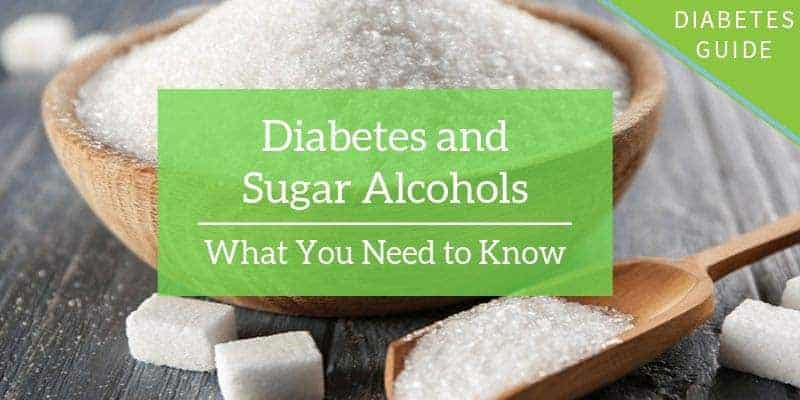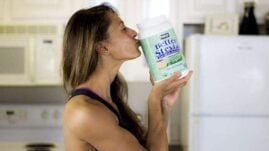If you’ve experienced even one Valentine’s Day or Christmas since you were diagnosed with diabetes then you’ve likely eaten a few of those “Sugar-Free Russell Stover’s” chocolates. They are sweetened primarily with “sugar alcohols” with more than 7 or 8 grams in each chocolate.
But sugar alcohols aren’t always a harmless replacement for sugar. And there’s more than one type.
In this article, we’ll look at what sugar alcohols are made from, how they do or don’t impact your blood sugar, and the side effects of eating too much of anything containing sugar alcohols.
For a guide to natural sweeteners, read The Best Sweeteners for People with Diabetes.

What are sugar alcohols?
Sugar alcohols aren’t actually sugar or alcohol. Instead, they are a type of carbohydrate whose chemical structure is similar to both sugar and alcohol.
Found naturally in plants — fruits and vegetables — today’s sugar alcohols are generally manufactured from cheaper sources like sucrose, glucose, and starch.
The potential benefit of sugar alcohols for a person with diabetes is that they are not fully absorbed and digested by the body, which means you get the sweet flavor without the full serving of eventual glucose in your bloodstream.
While they all taste “sweet,” they don’t taste identical to sugar. Some have a more metallic, chemical, or iron-like taste.
You can determine if a food contains sugar alcohols by looking at the nutrition panel — it will be listed under “Total carbohydrate” as “Sugar alcohols” or more specifically by the exact type of sugar alcohol. And by reading the list of ingredients to identify exactly what sugar alcohol was used.
However, not all sugar alcohols are created equal. Let’s take a look at the different types.
Types of sugar alcohols
The sugar alcohols you’ve probably seen on older packaged “sugar-free” foods include sorbitol and maltitol, but there are many different kinds.
- Erythritol: made from wheat or corn, used in food — considered the safest!
- Sorbitol: Made mostly from potatoes, used in food
- Lactitol: Made from whey (dairy), used in food and as a laxative
- Maltitol: Made from wheat, tapioca, or corn, used in food
- Xylitol: Made from birchwood, used in medications and food (*NOTE: Xylitol can be fatal if eaten by a dog! Keep away from your pets — even sugar-free gum could be dangerous.)
- Glycerol / Glycerin / Glycerine: used primarily in medications, not food
- Hydrogenated starch hydrolysates: made from potato, corn, or wheat, used in food
- Isomalt: Made from beets, used in food
- Mannitol: Made from sugar, used in medications and food
How do sugar alcohols impact your blood sugar?
The impact of sugar alcohols on your blood sugar varies tremendously depending on which one you’re consuming. (Read the ingredients list and the nutrition panel to determine which one is in what you’re eating!)
In general, their calorie content can range from 1 to 3 calories per gram compared to 4 calories per gram for basic sugar.
This means that sugar alcohols containing 3 calories per gram can affect your blood sugar nearly as much as regular white sugar.
Erythritol contains nearly zero calories per gram and has become very popular in ketogenic and low-carb baking as a result.
Isomalt also contains essentially zero calories per gram and is used in many packaged “sugar-free” foods.
Sorbitol, maltitol, and hydrogenated starch hydrolysates, on the other hand, contain nearly 3 calories per gram. These are both commonly used in “sugar-free” chocolate, candy, and other packaged foods.
The number of grams of these sugar alcohols listed on the nutrition label won’t impact your blood sugar as much as the same amount in white sugar, but they will raise your blood sugar some.
The best way to find out how much is to check your blood sugar often after consuming anything containing sugar alcohol as its primary sweetener.
Make a note of how much insulin you took to cover the carbohydrates listed on the nutrition label and/or how your blood sugar reacted during and after the first 2 hours of eating it.
Every other sugar alcohol falls somewhere in the middle, with around 2 calories per gram compared to white sugar’s 4 calories per gram.
Safety and side-effects of sugar alcohols
Are sugar alcohols safe to eat? In short — yes — sugar alcohols are generally safe to consume; however, they should be eaten in careful moderation.
The side effects of eating sugar alcohols are referred to as “frequency-based adverse effects,” which means that eating too much in one day or eating them too often throughout a single week can lead to some uncomfortable symptoms.
“Sugar alcohols are slowly and incompletely absorbed from the small intestine into the blood,” explains the Food and Drug Administration. “Once absorbed, they are converted to energy by processes that require little or no insulin. Some of the sugar alcohol is not absorbed into the blood. These pass through the small intestine and are fermented by bacteria in the large intestine.”
Common side effects of eating too much sugar alcohol in one day are:
- Gas
- Cramping,
- Loose stools
- Diarrhea.
The symptoms could last for an entire day while your digestive system is working the sugar alcohols out of your system.
Some people find that the longer they continue to consume foods containing sugar alcohols, the fewer uncomfortable digestive symptoms they experience.
Recommended daily intake of sugar alcohols
There is no clear consensus on the recommended max daily intake of sugar alcohols.
The Food and Drug Administration (FDA) requires all foods that may cause you to consume more than 50 grams of sorbitol in one day have the label: “Excess consumption may have a laxative effect”.
Sorbitol is one of the harsher sugar alcohols on your digestive system.
While there aren’t specific recommendations for every type of sugar alcohol, a limit of 50 grams is a wise quantity to apply across the board.
Should you include sugar alcohols in your diet as a person with diabetes?
This is a very personal decision. For some, baking with erythritol is what makes them feel good about enjoying desserts, and helps them achieve their blood sugar goals without feeling deprived.
For others, sugar substitutes aren’t worth the digestive troubles, the funky aftertaste, or the overall feeling of eating a “fake” version of the real thing.
Of course, give sugar alcohols a try! You can’t know if they’re a good fit for you and your diabetes goals until you try them.




Donald
I would like to say that I really enjoy ur articles and since I am a type 2 diabetic for over 20 yrs, I will be 80yrs young in Oct, these articles are for the most part very interesting. Anyway on to a quick question that I have. I have been drinking “sugar free” coffee creamer from Nestle with my decaf coffee and after reading some of the ingredients I feel that it is not that “sugar free”. So I no longer drink coffee unless I can truly find a sugar free creamer. I really enjoy decaf and would like to continue but until I a sugar free creamer looks like I am doomed to no longer drink decaf.
Question: is there tea that I can find that would be great for me to drink instead of decaf? I have been unable to fine a true sugar free (no diet tea for me) tea drink so far. I do in fact use truvia made from stevia leaf from costco, but I like the flavor of stevia a little better. Is this ok to use? Just sayin.
Anyway please be safe out there and take cae,
Donald
Christel Oerum
Yeah, unfortunately, a lot of “sugar-free” products are not so low in carbs.
As for tea, it sounds like you might be asking for pre-brewed tea. I had Snapple zero sugar peach tea before and really enjoyed that. You can also find other zero sugar products in most major grocery stores. Remember to look at the nutrition label for carbs and check the ingredient list. And you can of course also brew your own tea. Mint tea is great and caffeine-free
Silver
I can’t stand the lingering, foul taste of Stevia and Monkfruit… but I love the minty nuance of Erythritol, and have no digestive side effects from it. Maltitol does horrible things to my digestion, by contrast. I don’t see any mention of Xylitol’s influence on blood sugar in this article, but I haven’t had a problem using it, and haven’t noticed any foul taste from it. I had gotten quite fond of the Dr. John’s hard candies, made with Xylitol and Erythritol. They were very handy to carry in my pocket for when I had a craving for something sweet, without having to worry about blood sugar spikes, and tasted no different from candies made with sugar. Unfortunately, now they’ve started adding Stevia to them as well. I just wish I didn’t find Stevia on the label 98% of the time when I see ‘Sugar Free’. I’d rather eat something with sugar than that stuff, despite the risk. It doesn’t just taste disgusting, the taint lingers for a long time after eating anything with it. It’s almost as foul as cilantro leaf.
Monique
I can’t tolerate sugar alcohols at all. Erythritol is out because I am allergic to corn. The only sweetener I use with few problems is Stevia. It depends on the brand. I am better off consuming small amounts of real sugar, INFREQUENTLY, in very small amounts. There it is.
Hansika Motwani
Sugar alcohols has zero effect on my blood sugar or gastric health.
Ivan
Sugar alcohols has zero effect on my blood sugar or gastric health.
Louis Carter
Mines either
Ginger Vieira
HI Ivan! That’s great — sounds like your body tolerates them very well. If you have type 2 diabetes, they may be impacting your blood sugar a little but you’re not seeing it because your body is able to produce enough insulin to cover the impact.
Thanks for reading!
Cathy
I’m a Prediabetic i have problems with my bmi I’m at 29 it was at 3.6 my weight was 236 I’m down to 185 i gain a pound I lose a pound it’s not easy can’t read Carbohydrate’s and add the calories and Alcohol sugar added sugar I need heeelp
Christel Oerum
I would ask your doctor if she/he can refer you to a diabetes educator or Registered Dietitian so you can get the support you need. It might even be covered by your insurance